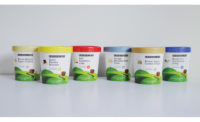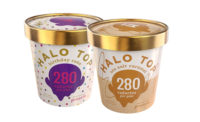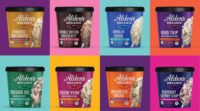Snoqualmie Ice Cream: Perfection in a pint
‘We make perfect ice cream,’ says the owner of Snoqualmie Ice Cream in Washington state. Organic milk and cream, innovative flavor combinations and homegrown herbs and fruits contribute to the products’ popularity.





Fans can like the Facebook page of their favorite ice cream brand and Tweet all day long about its flavors. But sometimes, to really understand a company’s mission, you have to meet face-to-face with the owners and watch how they make ice cream. That’s the approach Snoqualmie Ice Cream owner Barry Bettinger takes with his distributors. He invites them to tour the fully sustainable manufacturing plant in Maltby, Wash., and make ice cream. Once the visitors see the passion of the company’s 12 employees and the integrity in manufacturing a super-premium organic ice cream (19% butterfat and 15% overrun), they “get it,” Bettinger said.
He and his wife, Shahnaz, bought Snoqualmie Ice Cream in 1997 because they wanted to work together, Bettinger said. Since then, Snoqualmie has grown on average 20% per year. Barry Bettinger worked in management in various dairy plants for more than 20 years before buying the company. Shahnaz, who holds a master’s degree in counseling, oversees finance, communications and customer relationship management.
With a strong following in the Northwest, the Bettingers have begun a nationwide expansion. Its ice cream customers are retailers and foodservice accounts. Snoqualmie sells ice cream mix to other ice cream companies.
Diversified customer base
Snoqualmie Ice Cream manufactures all-natural ice cream, custard, gelato and sorbet. Its 20 flavors in pints are sold at major grocery chains and specialty stores in the Northwest and Southwest. The company has more than 800 custom-developed flavors for nearly 150 specialty foodservice accounts, with an emphasis in fine-dining restaurants and ice cream parlors. Seattle accounts include Sky City at the Space Needle, Top Pot Doughnuts and Ivar’s. Ice cream mix customers include Molly Moon’s, Full Tilt and Lunchbox Laboratory, all in the Northwest. Bettinger said he is developing co-packing opportunities.
Pints are the most successful. Bettinger cites geographical expansion through new distributors as the reason.
“The pints grew organically through 2010. In 2011, we did a full rebrand of the company and packaging, which helped increase overall sales and awareness,” Bettinger said. “From 2012 and on, we have developed strategic marketing programs, including public relations, traditional advertising and several other marketing channels. We’re performing research and development on new flavors, as well as new packaging options, including 3.5-ounce sizes.”
Bettinger is not shy when it comes to talking about his products.
“We make perfect ice cream,” he said. “We offer delicious flavors, quality ingredients and a true 16-ounce pint.”
Sustainable production
Perfection starts with vat pasteurization. The process gives the ice cream a better flavor than HT/ST pasteurization, Bettinger said. “It gives us the ability to give each flavor its own unique, high-quality recipe.”
Before building the plant, Snoqualmie was buying ice cream mix. Each of the 20 flavors of the Snoqualmie brand has its own recipe and is built into the mix. Gabriel Maldonado is the production manager. The facility makes ice cream seven days a week in the summer and four to five days at other times. It has the capacity to produce 3 million pints a year.
Edaleen Dairy in Lynden (near the Canadian border) is the source of hormone-free milk and cream. Snoqualmie makes its own ripples and inclusions, drawing from home-grown ingredients on the farm built in 2012 behind the plant. The farm provides eggs for the custards and botanical ingredients (including lavender and many fruits). Other fruits are sourced from growers in Washington and Oregon. These ingredients contribute to the ice cream’s clean label.
Snoqualmie’s sustainability practices give the company an additional selling point to use in marketing channels and public relations. The plant is fully sustainable, from the design to the mini-farm, he said. Chicken manure is spread on the fields or composted with other organic waste.
All of the hot water needs (including heating the building) comes from the refrigeration compressor rack through heat exchangers. Rain gardens divert water away from the municipal supply. Pervious parking surfaces allow water to drain into the soil rather than run off. The plant discharges nothing into the storm water system.
Connecting through social media
Ice cream is a promotions-driven category. Snoqualmie has “very aggressive promotions at grocery stores, as well as manufacturer coupons,” Bettinger said.
Marketing Manager Samantha Zahn said the company is rolling out a new advertising campaign in May and June that will use print, billboard and transit. Ads will promote “handcrafted happiness.” As for social media, Facebook is the main channel used for interaction and customer service. The company is also active on Twitter, LinkedIn, Instagram, Tumblr and Pinterest.
Snoqualmie is positioned to take advantage of consumers’ growing interest in quality ingredients and locally produced foods.
“Market conditions are great, because consumers are becoming more educated and strategic about what they eat,” Bettinger said.
In talking about the company’s mission, Bettinger never mentions profit (although the company has been profitable every year, he said).
“We are in business to create the perfect ice cream, gelato, custard, sorbet, sherbet and mix, while taking care of our customers, each other and our community. Everything we make should be as perfect as possible. We have a responsibility to our customers, to each other, to our community and to our environment.”
Looking for a reprint of this article?
From high-res PDFs to custom plaques, order your copy today!








